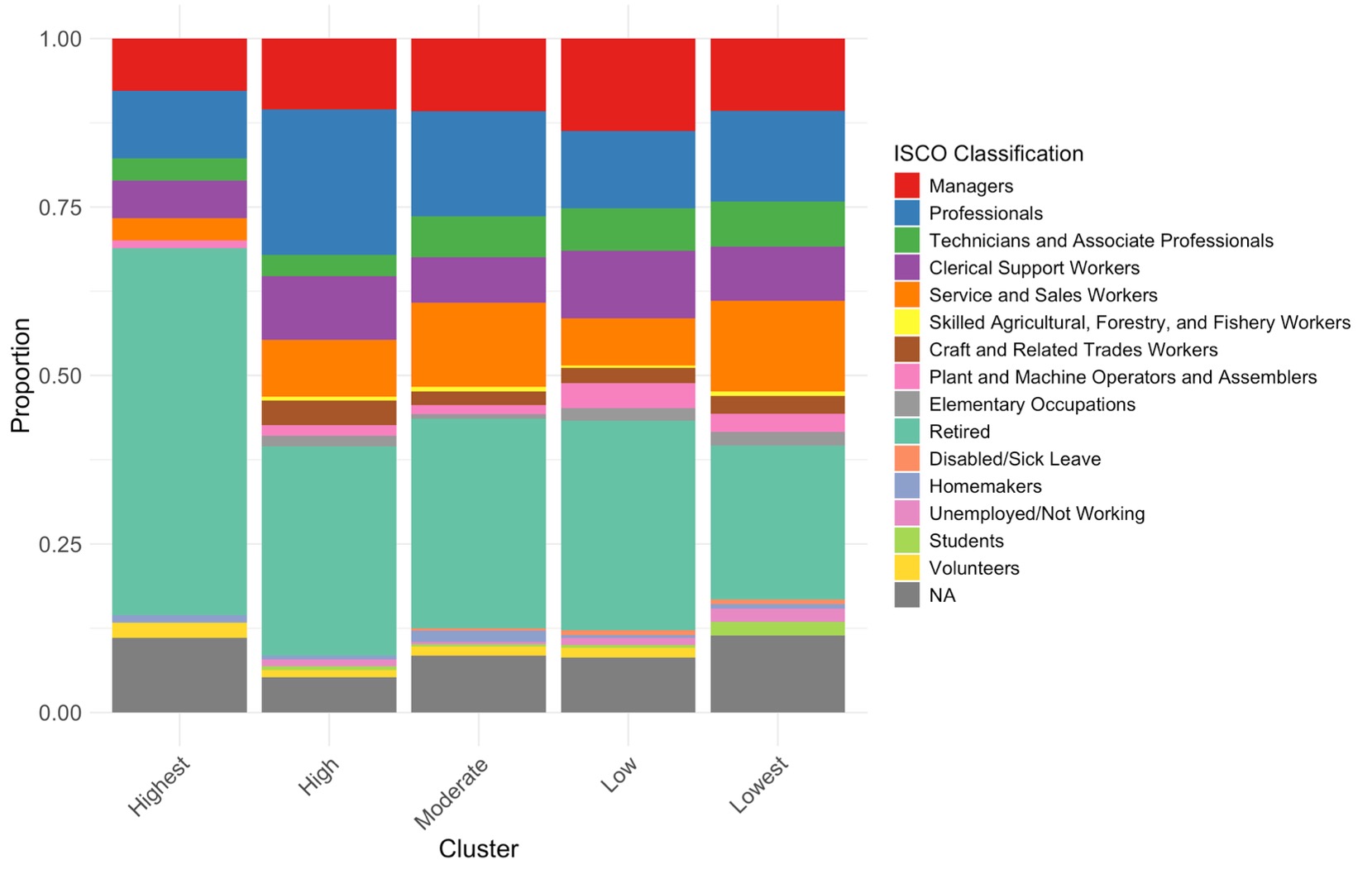Session Information
Session Type: Poster Session B
Session Time: 10:30AM-12:30PM
Background/Purpose: Work status and employment can be impacted in people with inflammatory arthritis (IA). We aimed to assess the association between health literacy and work status in people with IA.
Methods: Adults with IA, recruited to the National Early Inflammatory Arthritis Audit (NEIAA) in the UK, were invited to complete an online survey (March to May 2024), comprising the Health Literacy Questionnaire (HLQ), Work Productivity and Activity Impairment questionnaire, and questions on demographics, employment and education. The HLQ comprises 44 questions and nine scales which each measure an aspect of health literacy, and assess experiences of understanding, accessing and using health information.Occupation was classified as per the International Standard Classification of Occupations (ISCO) and UK Standard Occupational Classification (SOC), which classifies by skill levels (1-4). Responses were matched with original records within NEIAA. Agglomerative hierarchical clustering, using Ward’s method, was applied. Differences in health literacy, socio-demographics and work status were compared between clusters.
Results: In total, 995 patients with IA were included, with median age 59 years (IQR 50-67) and 66% female. Cluster analysis yielded five clusters according to HLQ scores (Table 1).The “highest” health literacy cluster contained the greatest proportion of retired individuals compared to all other clusters, with the “lowest” health literacy cluster having the smallest proportion of retired individuals and greatest proportion of unemployment (Figures 2 and 3). The “highest” health literacy cluster also had lowest mean presenteeism (18.3; SD 18.9), compared to 52.2 (SD 27.2) in the cluster with lowest health literacy. The “lowest” health literacy cluster had seven-fold greater absenteeism compared to the “highest” health literacy cluster and greatest impairment in the HLQ domains: “Feeling understood and supported by healthcare providers”, “Engagement with healthcare providers” and “Navigating the healthcare system”.The greatest combined proportion of managers and professionals, and SOC Skill Level 4, was in the “high” health literacy cluster, while the greatest proportion of SOC Skill Level 1 was in the “low” health literacy cluster.Education did not significantly vary between clusters. The lowest two health literacy clusters had the greatest proportion of people with highest educational level at GCSE or equivalent and the lowest proportion of people with a postgraduate degree or equivalent.
Conclusion: The “highest” health literacy cluster comprised largely retired individuals, compared to all other clusters. Clusters with higher HLQ scores had a greater proportion of people in high-skilled work, and lower absenteeism and presenteeism. Lower health literacy was associated with low-skilled work, and higher absenteeism and presenteeism.Our results suggest being in work leads to increased communication, support and wellbeing of individuals with IA, important for engagement with healthcare providers. Retired individuals have very high HLQ scores, suggesting health literacy may increase with experience and engagement with health services over time.
 Table 1: Outcomes presented by health literacy cluster. Absenteeism is defined as the percentage of time absent from work. Here, absenteeism was analysed as a binary variable, as absent ≤5% or >5% of time. Presenteeism is measured by the degree health problems affected work productivity of the last 7 days, expressed as a percentage score representing impairment due to health reasons while working; higher numbers denote greater impairment and less productivity. SD= standard deviation.
Table 1: Outcomes presented by health literacy cluster. Absenteeism is defined as the percentage of time absent from work. Here, absenteeism was analysed as a binary variable, as absent ≤5% or >5% of time. Presenteeism is measured by the degree health problems affected work productivity of the last 7 days, expressed as a percentage score representing impairment due to health reasons while working; higher numbers denote greater impairment and less productivity. SD= standard deviation.
.jpg) Figure 1: International Standard Classification of Occupations (ISCO) distribution by health literacy cluster
Figure 1: International Standard Classification of Occupations (ISCO) distribution by health literacy cluster
.jpg) Figure 2: Standard Occupational Classification (SOC) skill levels by health literacy cluster
Figure 2: Standard Occupational Classification (SOC) skill levels by health literacy cluster
To cite this abstract in AMA style:
Dey M, Norton S, Cope A, BUCH M, Osborne R, Galloway J, Nikiphorou E. Health literacy and work status in people with inflammatory arthritis: a cluster analysis in a national cohort [abstract]. Arthritis Rheumatol. 2025; 77 (suppl 9). https://acrabstracts.org/abstract/health-literacy-and-work-status-in-people-with-inflammatory-arthritis-a-cluster-analysis-in-a-national-cohort/. Accessed .« Back to ACR Convergence 2025
ACR Meeting Abstracts - https://acrabstracts.org/abstract/health-literacy-and-work-status-in-people-with-inflammatory-arthritis-a-cluster-analysis-in-a-national-cohort/
